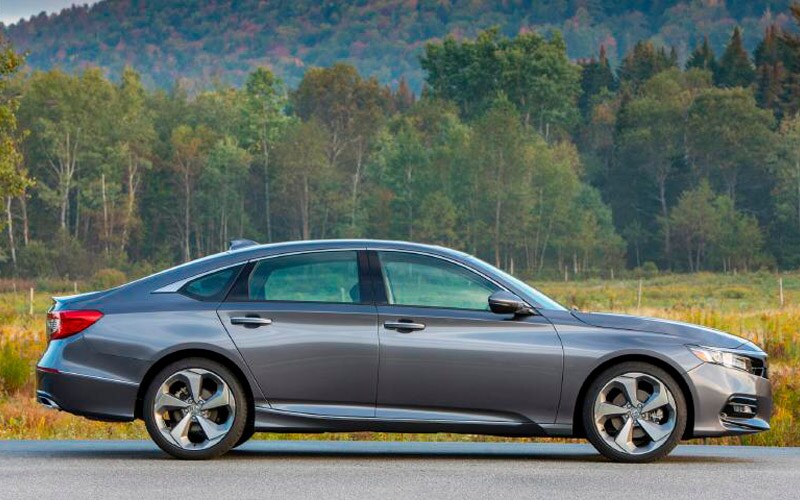New? Create an account
Enter your registered email address below to receive password reset instructions.
Please check your inbox and follow the password reset instructions.
Your account is ready to roll! ![]()
Save your favorites and access them
anytime, anywhere, on any device.
Happy exploring!

Shopping cars within 250 mi of your nearest EchoPark.
4001 Karlov Ave
Crestwood, IL 60445
Share this article
Published January 07, 2022
Honda Accord vs. Honda Civic
Share this article

Honda. The name conjures up words like reliability, innovation and efficiency.
Models like the Accord and Civic from the Japanese automaker are super popular in the United States, and you may be thinking about buying one.
But which model best suits your lifestyle? The compact, fun-to-drive and gas sipping Honda Civic, or the larger, more powerful Honda Accord?
To help you decide which model is best for you, we’ll look at the important elements of both of these popular cars, including:
The most obvious difference between the Accord and Civic is size, with the Civic being the smaller of the two.
The Honda Civic may be smaller but still offers potent engine options, from a a 158-horsepower 2.0-liter four-cylinder in the Civic sedan LX and Sport trims, to a a turbocharged 1.5-liter four-cylinder that produces 174 horsepower in the Civic sedan EX, EX-L Touring trims, and the LX and EX hatchbacks.
That same engine makes 180 horsepower in Civic hatchback Sport and Sport Touring trims. The performance-oriented Civic Type R hatchback is powered by a turbocharged 2.0-liter four-cylinder engine with 306 horsepower.

Drivers will find these engine options engaging and fun to drive, and also gas efficient. Regardless of which engine you choose, you’ll get up to 32 mph in the city and up to 42 mpg on the highway in a Honda Civic.
The Honda Accord also offers a peppy powertrain with adept handling. The base engine is a 1.5-liter turbocharged four-cylinder with 192 horsepower, available in the LX, Sport, Sport Special Edition and EX-L. A 2.0-liter turbocharged four-cylinder with 252 horsepower is available in the Sport trim, and comes standard in the Touring model.
The Accord also gets good gas mileage for a midsize sedan, up to 32 in the city and up to 38 on the highway.
From $24,970
Engines: 1.5-liter turbocharged four-cylinder with 192 horsepower; 2.0-liter turbocharged four-cylinder with 252 horsepower
Miles per gallon: up to 32 mpg city, up to 38 mpg highway
From $21,250
Engines: 158-horsepower 2.0-liter four-cylinder; turbocharged 1.5-liter four-cylinder with 174 horsepower
Miles per gallon: up to 32 mph city, up to 42 mpg highway
Both the Accord and Civic come with a long list of safety features.
Standard advanced safety features for the Honda Civic are:
Blind spot monitoring is also available as an option.
The Honda Accord also has a suite of standard advanced safety features, including:
Available advanced safety features for the Accord are heads-up display, front and rear parking sensors, blind spot monitoring, rear cross traffic alert and rear-seat reminder.
The Insurance Institute for Highway Safety gave the 2021 Honda Civic the highest rating of Good in all six crash safety tests. The National Highway Traffic Safety Administration gave the 2021 Civic an overall safety rating of five out of five stars, with five stars in the frontal crash, side crash and rollover tests.
Like the Civic, the Accord also performs well in crash tests. The National Highway Traffic Safety Administration gave the 2021 Honda Accord an overall safety rating of five out of five stars, with five stars in the frontal crash, side crash, and rollover tests. The Insurance Institute for Highway Safety gave the 2021 Accord the highest rating of Good in all six crashworthiness tests.
The 2021 Honda Civic and Honda Accord score the same for reliability. Both cars have a predicted reliability score of 82 out of 100.
A J.D. Power predicted reliability score of 91-100 is considered the Best, 81-90 is Great, 70-80 is Average, and 0-69 is Fair and considered below average.
Both the Honda Accord and Honda Civic seat five - the Accord more comfortably so in the back seats due to 3 more inches of legroom than the Civic. But the Civic is also roomy for a small car, with spacious seating for passengers.
Cloth upholstery comes standard in both cars, with leather-trim upgrades available for the Civic. Higher trims of the Accord come with synthetic leather upholstery.
The Accord features one of the best interiors in the midsize sedan class. “It's stylish and spacious, and the materials quality is great for the segment,” according to U.S. News and World Report. “In fact, in higher trims, the Accord feels almost like a luxury vehicle.”
The Civic’s cabin boasts high-end materials but critics say the design isn’t as fresh or high quality as rivals like the Mazda3.
In the area of infotainment systems, the Accord has a large touch-screen that’s easy to use, with a user-friendly interface.
U.S. News calls the standard Civic infotainment system “bare bones” and says it’s easier to use, while the available upgrade isn’t as responsive and more difficult to use while driving.
This Honda has one of the largest trunks in the class. It provides 16.7 cubic feet of cargo space, which is enough room for about a dozen shopping bags.
The Civic sedan has up to 15.1 cubic feet of trunk space, which is great for the class. The hatchback is even more spacious, with up to 25.7 cubic feet of cargo room behind the rear seats and 46.2 cubic feet once you fold down the back row.
If you want a fuel efficient car with plenty of space that’s fun to drive, both the Honda Accord and Honda Civic are great choices, and both are considered a good value. For a little more size, room and power, go with the Accord. Still having trouble deciding? Our Experience Guides can help you find the right used Honda Civic or used Honda Accord for you.